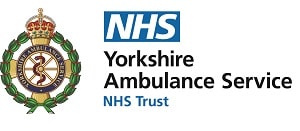Water safety warning from Yorkshire Ambulance Service
13 June 2018
Yorkshire Ambulance Service NHS Trust (YAS) is reminding everyone to stay safe around water this summer.
In 2017/18, ambulance crews attended 239 drowning incidents across the region, with many of those incidents happening in May, June and July.
More than 700 people drown in the UK and Ireland every year, with further losses of life abroad. Drowning is also one of the leading causes of accidental death in children.
To help reduce the number of incidents, YAS is supporting the Royal Life Saving Society UK (RLSS UK)’s Drowning Prevention Week.
This year’s campaign, which runs from 15 to 25 June, is encouraging schools, clubs, leisure centres and communities to promote water safety through events, lessons, games and activities to make people more aware of the dangers.
Mike Dunn, RLSS UK’s Deputy Director of Education and Research, said: “Higher temperatures during the summer can tempt some people to cool off by swimming in places such as rivers, lakes and reservoirs, but the water can be extremely cold, with hidden hazards like debris, sudden changes in depth and rip currents. These factors can turn a bit of fun into a tragedy all too quickly.”
Stephen Segasby, Deputy Director of Operations at Yorkshire Ambulance Service, added: “Warmer weather usually means an increase in 999 calls to incidents where people have needed emergency medical attention after swimming in rivers, reservoirs and other waterways.
“Even on a hot day, the temperature of deep water rarely gets above freezing, and swimmers can easily suffer cold water shock and put themselves at risk of drowning.
“Every year, lives are tragically lost across the UK, so please stay safe and stay out of open water.”
Advice from RLSS UK
RLSS UK is offering advice to help reduce the risk of drowning at home and on holiday:
- Always use self-closing gates, fences and locks to prevent children from gaining access to pools of water.
- Securely cover all water storage tanks and drains.
- Empty paddling pools and buckets as soon as they have been used. Always turn paddling pools upside down once empty.
- Always supervise bath time (never leave children unattended). Empty the bath as soon as possible after use.
- When researching your holiday, or arriving at your destination, check the safety arrangements of any water-based activities and if there is lifeguard cover at the pool or beach.
- Check bathing sites for hazards, check the safest places to swim and always read the signs - find out what local warning signs and flags mean. Take time to check the depth, water flow and layout of pools.
- Swim with any children in your care - it’s more fun and you can keep them close and safe.
- On beaches, check when the tide will be high and low, and make sure that you won’t be cut off from the beach exit by the rising tide. Also, be aware of dangerous rip currents.
- Inflatables like dinghies or lilos are a well-known hazard - each year, there are drownings as people on inflatables are blown out to sea. Don’t use them in open water.
- Don’t swim near to or dive from rocks, piers, breakwaters or coral.
- Swim parallel to the beach and close to the shore.
You can find more safety tips at www.rlss.org.uk
Produced by: Corporate Communications Department

